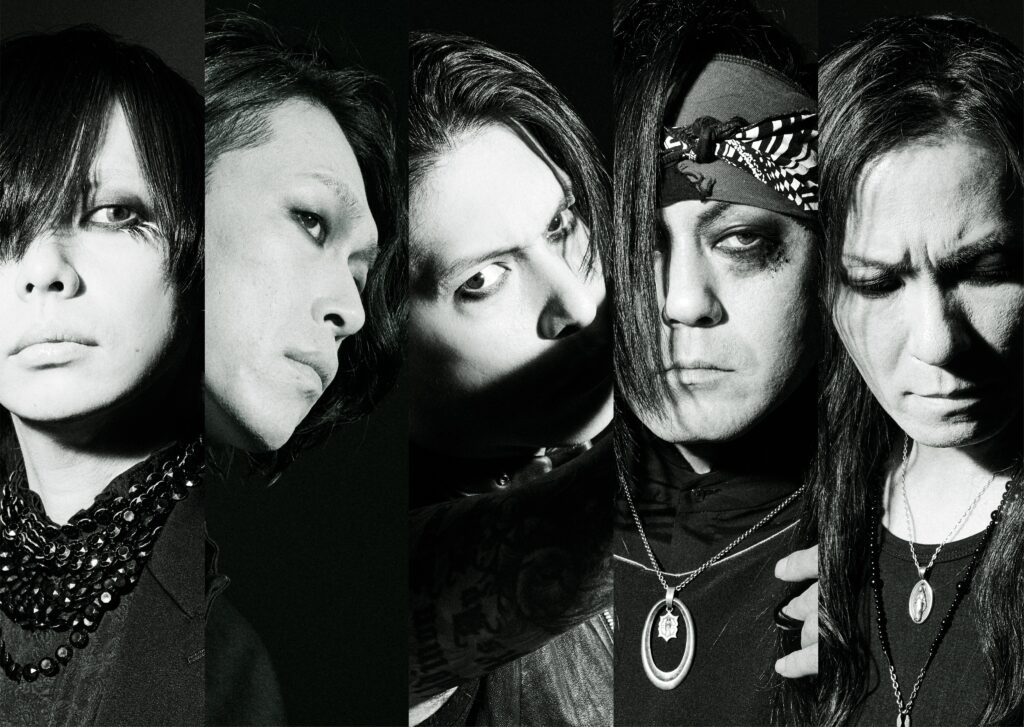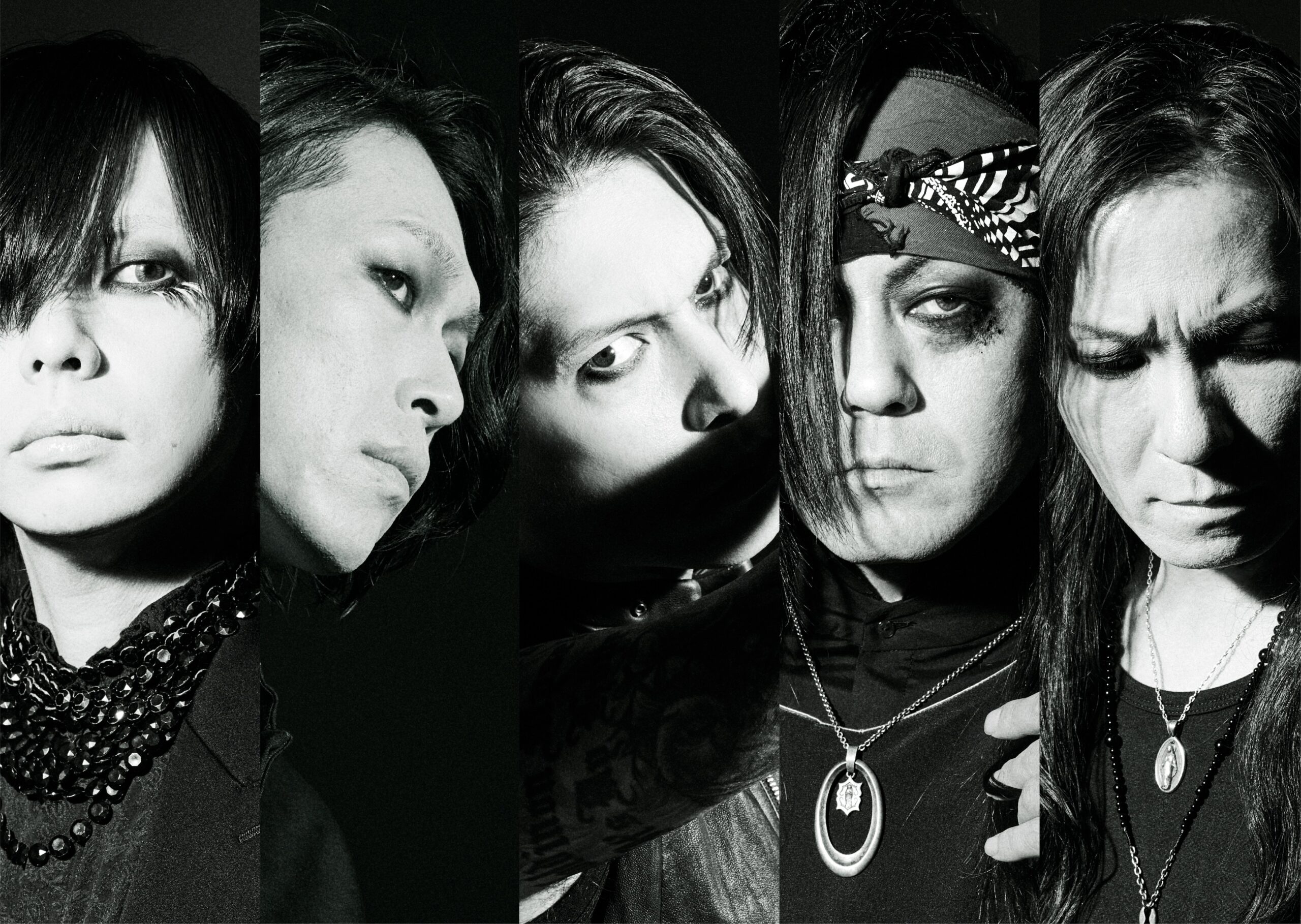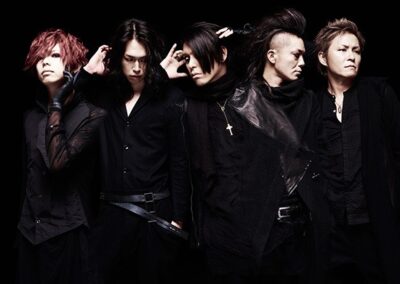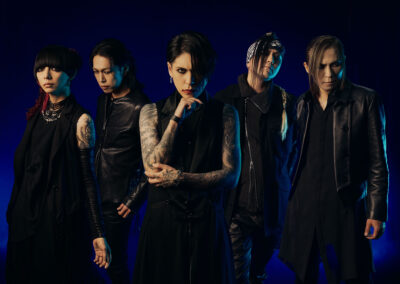Rising from the lows, lynch. is back with a fierce mindset, ready to conquer new zeniths
lynch., a prominent and successful Japanese metal band formed in 2004 which faced an unexpected turn of events on December 31, 2021, when they announced a temporary hiatus. This hiatus stemmed primarily from vocalist HAZUKI‘s struggles with songwriting, a challenge exacerbated by his pivotal role as the band’s main composer. Throughout the hiatus in 2021, each member of lynch. embarked on individual musical projects, expanding their horizons and honing their skills. This period of exploration proved invaluable, providing the band with diverse experiences and perspectives. Now, with the release of their album REBORN (March, 2023) and the highly anticipated EP titled FIERCE (June 26, 2024), lynch. emerges revitalized and ready to conquer new musical territories. The hiatus provided them with an opportunity for introspection and growth, allowing them to rediscover their passion and reignite their creative spark. As they return to the spotlight, it’s evident that their time away has infused their music with fresh energy and inspiration, reflecting the culmination of their individual journeys and collective evolution.

——Thank you for having me today.
You took a hiatus on December 31, 2021, citing composing challenges as the reason. Last year, you made a return with an album aptly titled REBORN. Now, you’re gearing up to release an EP titled FIERCE. Do you feel a renewed sense of inspiration?
HAZUKI: I believe REBORN was an experimental project that steered lynch. in a direction that was quite unexpected for the band. This project allowed us to explore new things, breaking away from the sound that had become synonymous with lynch. over the past two decades. But, reflecting on our 20-year career, during which we consistently produced music that defined our unique identity, I realized that this experimental phase, while exciting, made me feel a compelling need to reconnect with and reaffirm the essence of who we are as a band. I felt motivated to present the core essence of lynch. I felt the desire to re-establish our musical roots became the driving force behind the creation of FIERCE. I think FIERCE is the reaffirmation of what lynch. truly stands for as a band.
——HAZUKI, you mentioned struggling with songwriting around the time of the 2016 album AVANTGARDE. Can you elaborate on the challenges you faced during that period?
HAZUKI: How I can put it simply without sounding negative (laughs)? Well, I felt utterly overwhelmed while working on AVANTGARDE. The crushing weight of a relentless workload and the creative exhaustion left me drained. The band’s nonstop activities gave me no breathing room, no time to recharge. It was an intensely challenging period; my mind was a blank canvas struggling to find new ideas, all while feeling the suffocating pressure to keep delivering new music.
——But despite these challenges, you still created albums XIII and ULTIMA. How did you manage to push through and complete these projects?
HAZUKI: For XIII, I chose to revisit the Visual-Kei style that had always been a source of inspiration for me. Instead of experimenting with new directions, I embraced the familiar and reimagined it in my own unique way. This approach allowed me to reconnect with the essence of what initially inspired me as an artist. When it came to ULTIMA, the concept was centered around cyberpunk, a theme that I find intricate and fascinating. To fuel my inspiration, I turned to external sources, particularly movies and anime. One significant influence was the anime BLAME! – which was released by King Records. The cyber world depicted in BLAME! Was a good fit for the direction I wanted for lynch., and it provided a wealth of ideas that helped shape the project. I guess inspiration is always within reach if you actively seek it out. By exploring different media and remaining open to new influences, I was able to overcome the creative hurdles and bring both XIII and ULTIMA to life.
——In 2021, you paused your activities but continued to perform with other bands. How did this experience influence your approach to music and what new elements have you brought back to lynch.?
Yusuke: Around this time, I began exploring instruments beyond the guitar, particularly synthesizers, and integrating them into our band activities. This expansion beyond the guitar opened up new possibilities for our music. When I reintroduced these experiences to the band, it not only enriched our creative process but also broadened our musical palette. As we resumed our activities, we were able to infuse these new elements into our songwriting and overall approach, resulting in a more diverse and dynamic sound for lynch.
Reo: As for me, I reached out to former band members with whom I had lost touch, sparking the revival of our band, kein. This reunion continues to thrive to this day. The creative process with lynch. and kein couldn’t be more different. kein’s music originates from free-flowing jam sessions, where adherence to music theory takes a back. What matters is that we find the music-s vibe cool. The approach is based on spontaneity and raw energy prevails, even if it meant defying conventional musical norms. Upon returning to lynch., we underwent a significant shift in perspective. We discarded rigid notions of music theory and instead embraced a more intuitive approach to songwriting. Rather than relying solely on technical expertise, we began trusting our instincts and emotions to guide our creative decisions. This transition marked a departure from traditional methods of music creation towards a more sensory-driven process. Instead of being bound by rules and conventions, we now prioritize authenticity and emotional feel.
Akinori: I have worked with various bands across different music genres, which helped me gain a broader perspective on music. By distancing myself from lynch. and collaborating with other bands, I was able to see lynch. from an external viewpoint. This new perspective made me realize how cool and unique lynch. really is. During this time, I noticed and appreciated the profound elements that set lynch. apart from other bands. This period of stepping back was significant because it led to many realizations about the band’s identity and strengths. Engaging with different music genres and projects gave me experiences I wouldn’t have had if I had only focused on lynch. This allowed me to recognize and value lynch.‘s unique qualities, leading to personal growth and a deeper connection with the band’s music and identity.
Asanao: I have been a support member for other bands for 3 to 4 years. During this time, I gained a renewed appreciation for lynch.’s professionalism. Working with other bands allowed me to see how skilled and dedicated lynch.’s members are. I’m not sure if I contributed back to the band or grew as a musician, but I am grateful for the experience and still contemplating its influence on me. The significant difference in musical styles between lynch. and the other bands I have worked with is, I hope, a sign of my adaptability and versatility. What is for sure is that lynch.’s continuous, energetic and heavy style sharply contrasts with the more paused and quieter music of the other bands. I’m uncertain if this experience had any impact on lynch.
——I am sure you it did.
Can you describe the creative process behind your latest EP, FIERCE? What themes or messages are you exploring in this release? How would you describe the sound and atmosphere of FIERCE?
HAZUKI: As the title suggests, the sound is fierce, as in aggressive and cool. Explaining the concept behind the word fierce is a bit embarrassing since Mandah, you are from overseas (laughs). I think the word fierce has a strong, impactful image. I wanted the EP to focus on the intense aspects, exactly as the title indicates. We didn’t try to balance it with anything else; the theme is purely as the title suggests. When creating FIERCE, I aimed to show that raw, powerful energy that defines lynch.’s music. It’s about embracing intensity and not holding back. The songs are crafted to reflect that ferocity, both in sound and emotion. The entire production process was driven by this desire to amplify the fierceness in our music, ensuring that every element contributes to that overarching theme.
——I see.
Could you please each of you introduce your favorite song on the new EP?
Reo: A FIERCE BLAZE, is my favorite track. The reason is that I brought the original song and HAZUKI added his touch, remove the rust and altering its structure in the process. Then came the guitars. The chords changed. We felt that different chords would fit better the song. Then I received Akinori’s bass phrase, and towards the end, the drum arrangement was added by Asanao. It really showcased everyone’s strengths. We created it together, each contributing our expertise. Even though it was all done online, it felt like a real face-to-face jam session. The song kept evolving rapidly, and I really appreciate how it turned out. I really dig the creative process of this song.
HAZUKI: UN DEUX TROIS. I am eager for you to hear the fresh tone of the shout I crafted in this track, something unique. I’m drawn to the raw energy of this song, and I believe we’ve skillfully captured that raw and new tone, new color of my shouts in the recording. I really wish it could reach people and touch their soul.
Akinori: MADARA. It’s a track with a Japanese title and a fresh style. This marks the first time lynch. has released a song with a Japanese title since our debut album, so there’s an element of anticipation from everyone. What’s more, this song is a collaborative effort between HAZUKI and myself. Typically, songs are created by Yusuke and HAZUKI alone, making this collaboration a new approach for us. Despite this, it’s a completed song that still embodies the essence of the entire band. While it’s not an entirely new experiment, it does represent a departure in style for us.
Asanao: UN DEUX TROIS. I think this song is the epitome of lynch. within this work; even those unfamiliar with lynch. can understand where we stand as a band. I believe this song truly embodies what lynch. is about. Even for those overseas who are unfamiliar with lynch., if they listen to this song, they’ll get a sense of what lynch. is all about. That’s what I like about it.
Yusuke: REMAINS. It’s a piece born from the world of the movie titled Dune. As I watched the film, I drew inspiration from its atmosphere and sounds, striving to capture and express them in the song. I found myself moved by this movie’s atmosphere and narrative. These elements resonated with me. I aimed to channel that inspiration into my music. I really like that aspect of the song REMAINS.
——Thank you for your insights.
What was the most challenging song to make?
HAZUKI: EXCENTRIC. How to put it simply? Well, the vocals in the A section of the song have a rap-like rhythm, and this was incredibly difficult to perform. Shouting at a high speed in Japanese was vocally challenging for me. We had to re-record that part around 500 times. It was a real struggle, but we finally got it right. I hope people will enjoy the song.
——Madness and pain appear to be central themes of the new EP. Could you elaborate on these themes?
HAZUKI: Hum, that’s probably true (reflects). The theme of madness does come up often. But for me, crazy has a positive image. I believe that madness can be beautiful. For example, when you’re deeply engrossed in something, that’s a form of madness. There’s no particular focus on pain, but madness is beautiful and represents an extreme state. While our songs may touch upon themes of intense emotion and turmoil, they do not necessarily focus solely on pain. I think madness is synonym with passion. I believe that during our live performances for example, we enter into a heightened state of intensity and creative fervor, which could be described as a form of madness.
——The EP ends with the ballad REMAINS, which talks about loss and the passage of time, right?
HAZUKI: Absolutely, that’s’ right. The song REMAINS encapsulates reflections on the passage of time and the essence of existence—living and inevitably facing mortality. It explores the never-ending cycle where acquiring something often means simultaneously losing something else. This perpetual exchange is a contemplation on the human condition, where the pursuit of one thing may result in the continual loss of another. The song is an exploration of how life unfolds, revealing the intricate balance between gaining and letting go, a perpetual cycle of our experiences.
——That’s deep.
Talking about life and death, in the middle of the COVID-19 pandemic in 2020, Lynch. launched a campaign to support music venues in Japan with the single Overcome the Virus raising about 11 million yen. Can you share more about this initiative?
Reo: At that critical juncture, live performances—the heartbeat of our music activities—were suspended, leaving many live music venues struggling to survive. While government aid provided financial relief, we felt a personal responsibility to give back to the places that shaped us. Eventually, we brainstormed actionable steps and implemented them. We decided to be pro-active in these difficult times. For us, live houses are not just venues; they are sacred spaces where our musical journey thrives. They are sanctuaries that nurture our artistic expression and community. Throughout our tours, we encountered heartfelt expressions of gratitude from live house owners. I was really happy to see this reciprocal cycle of support and appreciation. Beyond the economic impact, our initiative resonated emotionally, fostering a symbiotic relationship between our band and these pivotal venues.
——Thank you for showing solidarity.
Looking back, what has been the greatest highlight of your career with lynch. over the past 20 years?
HAZUKI: It has to be performing at Nippon Budokan. We had been working towards that goal for years 5 to 7 years. We finally played at Nippon Budokan in 2021 and this was a huge achievement for us. When we finally achieved that goal, it was incredibly rewarding. Everyone in the band feels the same way.
Reo: Absolutely. Being able to perform at Nippon Budokan was incredibly special. For Japanese artists, Nippon Budokan is a sacred place. Seeing the Japanese flag from the stage was a powerful moment. It felt so gratifying to finally accomplish this goal. This place is a symbol of achievement in the Japanese entertainment industry. It’s a cultural landmark. It’s one of the most prestigious and iconic venues here. It’s revered as a sacred space for music. Performing at Nippon Budokan is very special for us Japanese artists. Looking up from the stage and seeing the Japanese flag made it feel even more sacred. For many Japanese artists, performing at Nippon Budokan is a dream come true, representing one of the most successful points of their careers. That moment really hit home for us. It is something I will never forget, ever.
——As the band approaches its 20th anniversary, what are your hopes and plans for the future of lynch.?
HAZUKI: As we celebrate our 20th anniversary, we have various tours planned, but I really want to perform at Nippon Budokan again, this time with the audience allowed to shout and cheer. Additionally, I’d like to perform at an even larger venue like Yokohama Arena. It’s not decided yet, but personally, it’s a dream of mine.
Reo: My main goal is to keep going for as long as possible. To do that, we need to keep growing and improving. If we stay stagnant, we’ll start to decline. Growth should be constant. We need to keep climbing to sustain our longevity.
Akinori: Many bands that have been around for a long time tend to become stable, and their audience also becomes stable. But we don’t want to become complacent. We want to remain a cool band that continues to evolve. As a result, we aim to have a packed Budokan where the audience can shout and cheer. We don’t want to settle down; we want to keep pushing forward.
Asanao: lynch.’s 20th anniversary is a significant milestone, and I know fans are curious about our future. We want to create excitement and anticipation. Like everyone else mentioned, we want to perform at Nippon Budokan with a cheering audience. Our songwriting process has changed since FIERCE, so we’re looking forward to creating more great music. I am very looking forward to what the future holds for us. We are in a very good state at the time being.
Yusuke: One milestone at a time. I want to successfully reach each important step, whether it’s our 25th anniversary or 30th anniversary, steadily. We need to take care of our health and well-being to ensure we’re all still here and going strong.
——Thank you all.
Band: Thank you!
__________________
Mandah FRÉNOT
(c) VMJ
MORE INFO ON FIERCE EP: HERE
STREAMING PLATFORMS: KING RECORDS (JAPAN)
STREAMING PLATFORMS: JPU RECORDS (INTERNATIONAL)
OFFICIAL WEBSITE: HERE




